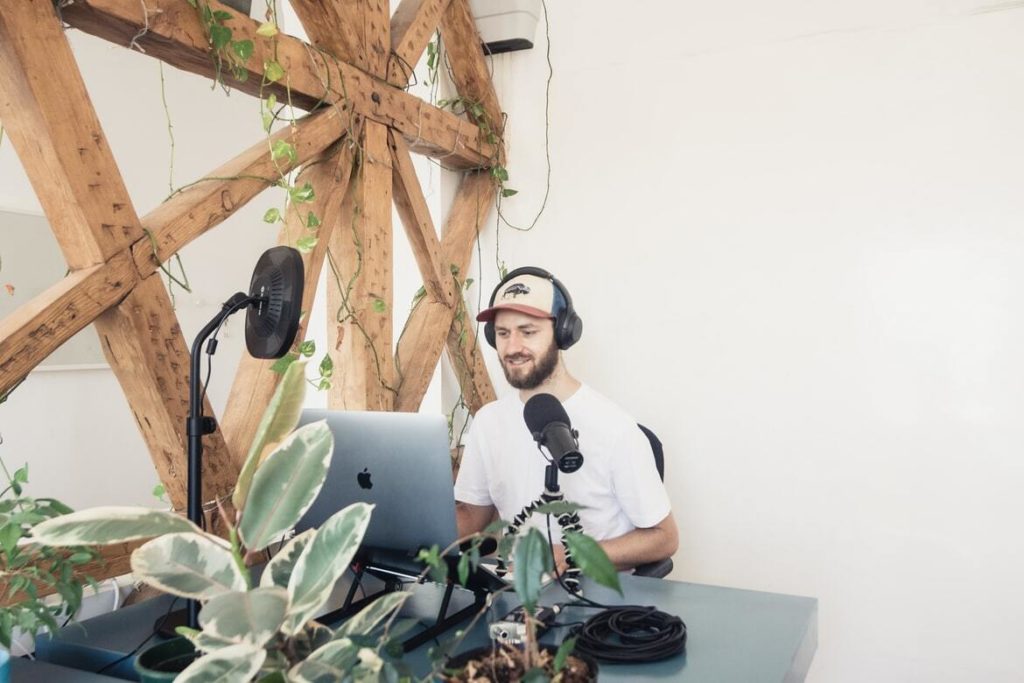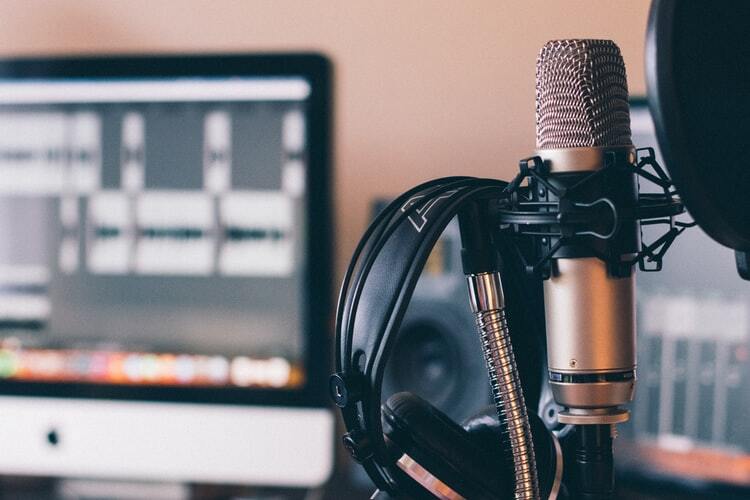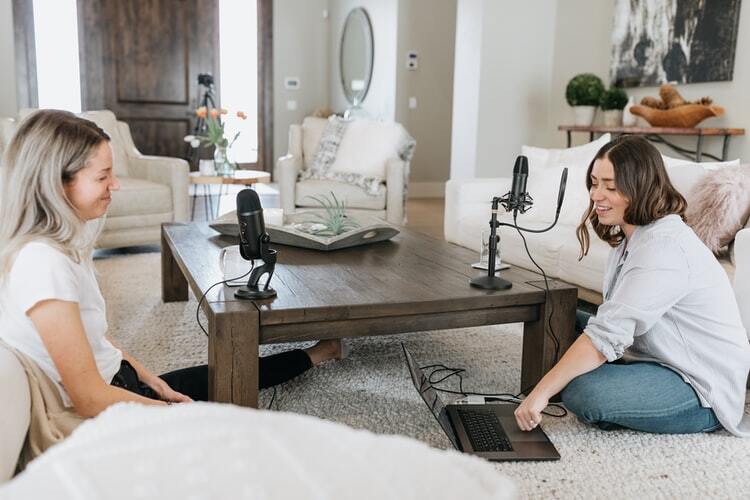We all know podcasting starts from an idea and a passion; but sometimes we find ourselves stuck, struggling with podcasting problems we don’t know how to get out of. We start to question whether we can truly handle all that comes along with podcasting and question our own capabilities as creators.
Whether you’re experiencing writer’s block, having trouble reaching new audiences, or simply can’t find the time to actually record your show, we’re here to tell you that these podcasting problems you’re experiencing are perfectly normal.“Maybe I’m not meant to be a famous creator.” “Maybe I just really suck at podcasting.”- It’s really easy to let these negative thoughts consume us; but the good news is, they can be overcome.

1. Podcasting and Talking
Oh the process of recording and constant re-recording! Being overly self-conscious about the way you sound or speak in your show that one tiny little error drives you crazy. Perhaps you don’t like your accent or the way your voice sounds in recordings. We’ve all been through that but you have absolutely nothing to worry about.
Realize that your recording does NOT have to be perfect. Chances are, your occasional pause, multiple “um’s” and quirky sound reactions would go unnoticed by the general audience. They are only amplified to your own ears as the creator behind the show. The natural, human podcaster is much more relatable and likeable. In fact, they connect better to the audience.
Depending on your type of podcast or genre, the core of podcasting may just very well be the art of storytelling. Doing the homework, being informed with the right facts and information, or extending entertainment value through witty comments can go a long way. Don’t shy away from the microphone and start experimenting!

2. Time and Environment
I don’t have time to record my podcast
So you’ve had a great podcasting idea that got you all excited. You’ve drafted out the entire show and planned everything in your head; but when it comes to ACTUALLY recording the episode, you simply can’t find the time to do so. Perhaps in your case, it comes down to the time needed for post-production. In other cases, it may even occur early on during the drafting and planning stages.
Now ask yourself: “Do I really not have the time or am I simply putting the tasks off?” A self-check every now and then can help you reevaluate and realign your motivations for podcasting. Lost the drive for podcasting? Ask yourself why: Is it due to an external factor or current life difficulties you’re facing? Prioritize your mental health and overall well-being. It is perfectly fine to go on a podcasting hiatus for a while and come back when you’re ready.
My guests and I can’t agree on a time
If your guests and collaborators live in the same country or state, scheduling a time to meet up for a podcast recording session is relatively easier. In most cases, there’s no need to worry about date and time differences. It goes without saying that virtual recording sessions are also part of your options, should it be a more convenient means for everyone.
Can’t agree on a time? Unless someone is deliberately trying to avoid the meeting, there must be a way to find a common ground. Have you tried listing out all your available times into the foreseeable future? Software and platforms like Calendly allow you to easily facilitate appointment scheduling through this method.
Calendly is also incredibly useful for cross-country or cross-state bookings, since the platform can automatically convert and reflect the dates and times to match the viewer’s timezone! It makes appointment booking so much easier for everyone. You’ll no longer have to convert time zones and worry about missing a meeting!

It’s too noisy to record a podcast
In most cases, the static “noise” found in recordings can be easily edited out through most audio-editing software. Did your neighbor’s dog bark in the middle of your recording? Don’t worry about re-recording. Most editing software also allows you to delete parts of a recording. Besides, leaving it on wouldn’t be the worst thing ever either.
Suppose it’s unbearably noisy like a home filled with multiple family members who are unwilling to turn their voices down. You may consider waking up a couple hours earlier than everyone else to record your podcast audio, with the flip side recording late at night when they’ve all gone to bed (though this one’s harder to keep constant!).
Some other quiet places you can try out when recording for your show: Rooftops, empty classrooms, empty coffee shops and restaurants, public parks, etc. If you’re willing to invest in equipment, dynamic microphones pick up less far-away sounds, so you might find that helpful.
The content creation process takes too much time
Podcasting generally starts as a hobby for most people. When talking to our Firstory users, we found that podcasters usually either talk about their passion or something related to their career. The lucky ones are those who get to merge the two and turn it into a podcast. However, since we generally have other things to do apart from podcasting (e.g. schoolwork, day jobs, family, and social life), it can sometimes be difficult to maintain a constant recording and posting schedule.
Acquiring the right tools that can help save time throughout the podcasting process can be a real life-changing experience. When promoting your show, you’ll probably want to leave a link people can use to get to your show. However, which link should you leave: Spotify? Apple Podcasts? Google Podcasts? All of the directories you’re on? That’s a bit time consuming and unprofessional. In fact, too many links can ruin the aesthetics of your post.
As a result, a lot of podcasters have repurposed Linktree and other bio-link tools for this. Unfortunately, setting up your Linktree can be time consuming, since you’ll STILL have to manually copy and paste each platform’s links. They’re also not self-updating. In contrast to this, FLink is a multi-link tool that’s designed especially for podcasters. It’s self-updating and auto-generated, so it definitely helps podcasters save a lot of time when promoting their show.
Do you spend a lot of time jumping from one social media platform to another gathering comments and identifying which each one pertains to? Drive your listeners to a single comment funnel that’s accessible to everyone through any web browser.
How can I maintain my podcast posting schedule?
The trick is to do a little whenever you can because you never know when something might come up and mess up your plans in the future. Don’t worry about being ahead of track, since you can always schedule your episode publishing date. Firstory users no longer have to worry about updating their unreleased episodes’ Flink either, since they’re self-updating. That means you could also prep your social media posts and descriptions in advance, saving a ton of time promoting your show.
3. Fresh Podcast Ideas
Experiencing writers’ or artists’ block? No worries, that’s perfectly natural for any creator. When going about your regular days and you find something remotely interesting, it would be handy to take note of these little things on your phone or on a tiny notepad. When you’re out of inspiration, you’ve got this list to get back to.
Go out for a walk, visit a new place, try new food, talk to strangers and make new friends; you never really know where your next inspiration will come from. Break away from your everyday routine, get out of your comfort zone, or find new ways to relax your mind. For some, this involves hanging out with friends or grabbing a drink at a bar. Others find solace in having a nice, long bubble bath while surrounded by scented candles. Do whatever floats your boat, whether they involve cozy crispy book pages or a night of computer games.
Better yet, why not acquire content straight from your listeners? The Voicemail function allows you to receive audio messages straight from anyone, anywhere, particularly from your listeners. Not only do you get to connect better with your audience, you also get to use their audio messages for future episodes. Problem solved!
4. Keeping up with Podcasting Trends
If you wanna stay in the game, you’ve got to know what’s happening in the game. However, with our respective busy schedules, it can be difficult to keep up with the trends and events in the industry. So what can you do? Leverage social media. With the amount of time you use scrolling through social media, you’re likely to come across some podcasting news and stuff. Follow reliable podcasting news channels and accounts, follow hashtags, and follow your favorite podcasters.
Apart from just connecting with other podcasters both in and outside of your niche, connect with listeners as well. Sometimes, listeners have a better picture and understanding of the entire industry’s trends than the people inside the industry! Subscribe to podcast newsletters and follow podcasting blogs. Most podcast hostings for one have their own blog sites.

5. Reaching New Audiences
This is perhaps the most difficult part for most. Beginner podcasters have trouble acquiring their first pool of listeners outside of family and friends while experienced podcasters eventually reach the plateau of growth. Realistically speaking, this applies to other creators as well such as YouTubers, influencers, digital artists, and songwriters. It takes a whole lot of work to keep your podcast audience growing, and here are two of some free, easy, organic ways to start:
Leverage social media
I know you’ve probably heard this advice too many times already and you’re sick of hearing it; but believe me when I say that social media is a powerful tool that still often gets overlooked. Most people spend their days scrolling through social media, and if you’re going to build a fanbase, you’re going to have to build a social media following. That involves:
- Being aware of the content you post and react to
- Monitoring your social media stats and analytics
- Having a consistent social media posting schedule
- Posting quality content that would appeal to your audience
- Being aware of how each platform’s algorithms work
- Actively interacting with followers and other creators
Collaborate and reach out to others
What’s stopping you from reaching out and collaborating with others? Go write that invitation message and email! Whether they’re celebrities, other podcasters, influencers, friends, family, industry leaders, listeners, or regular people, anyone you have on your show is a definite plus for your podcast exposure. Word of mouth is the primary form of reliable information dissemination. At the very least, you can be sure that their friends and family will be listening to your episode.
If your guests are other podcasters, the cross-promotion between both shows will facilitate a flow of listeners between the two podcasts. Assuming you’ve got an influencer or celebrity to hop into your podcast, you may want to provide them with a marketing kit they can use to promote your show. This kit may contain digital assets, templates, and other stuff they can use.
6. Monetization
The driving force behind every creator should be the craft itself and the listeners’ experience instead of mere monetary benefits. It is the joy found in the process of podcast creation; however, it’s always nice to be able to monetize the content for all the hard work we put into our passion projects.
When diving into podcasting, focus on your content, audience connection, engagement, and growth. Quality podcasting and strong relationships with fans are the two primary ingredients for audiences who are willing and happy to support their favorite podcasters. Whether you have a Patreon, Ko-Fi, Paypal, or Vimeo (you can add these links into your FLink) or are using the Firstory soon-to-be-available built-in monetization functionality, there are lots of different ways to encourage listeners to support your show. Find whichever works best for you 🙂

Pingback: How to Start a Podcast? 5 Easy Steps to be a Podcaster! | The Firstory Blog